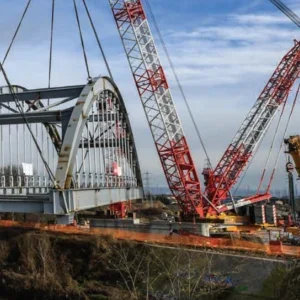The town of Heilbronn, not far from the city of Stuttgart, Germany was expecting its first snowfall of the winter when chief executive officer Dr. Peter Schiefer stopped to draw breath. It had been a hectic few months since he acquired tower crane manufacturer MAN Wolffkran GmbH.
Among the buildings dusted by the white stuff at the Wolffkran headquarters was a huge tent containing spare crane parts that had been cleared out to make way for the expansion of the production plant.
“Around 10 years ago the opposite would have been the case,” says Schiefer. Many big companies, he says, buy spare parts and more equipment than they need because it is a safe thing to do. “We want to expand production, not spare parts,” he adds.
In 2004, MAN Wolffkran’s 200 employees generated sales of €35 million. Schiefer wants to double the output of cranes before the end of 2006 although he refuses to divulge current production figures. “It’s aggressive growth,” he says, and he’s not wrong. “But I don’t see it as a gamble,” he adds.
In fact, Schiefer claims not to take gambles, and if he saw this kind of expansion as a risk then he would be happy to take things more slowly.
As it is, he is planning to make some big waves. “People are gun-shy about manufacturing in Germany,” he says. “I am not.” It is accepted, he continues, that the quality here is high, but people believe it is too expensive. “We want to prove Wolffkran can manufacture cranes successfully here,” says Schiefer.
He believes the market is on his company’s side: “I have been told by many people during my few months here that the strength and durability of our cranes is what makes us attractive. We want to continue manufacturing cranes that customers can use in 25 or 30 years’ time.”
Schiefer is a managing partner of a Swiss fund called m2 Capital Management AG with colleague Dr. Hans-Peter Koller. The latter, who is a 50% partner of Wolffkran, is not involved in the operational side of the company, but is responsible for a number of other projects within the equity group.
Schiefer laughs as he recalls the moment when the pair first met: “I tried to sell a company to him. In that respect, we started out working against each other,” he says. “He invited me, instead, to join him, and it went from there.”
Schiefer took the helm at Wolffkran in September, after the deal was signed on paper the previous month. The previous managing director was due to return to MAN at the turn of the year. “With that exception, which was always going to be the case, we have retained the employees we inherited,” says Schiefer. In fact, the company are at the start of a full-scale recruitment drive.
He adds: “We are looking to expand our sales team, and are looking for sales people with international experience.”
The structure within the company is being reviewed. Schiefer is planning to move administrative staff into sales roles. In his words, this is making more people more productive.
Schiefer has vast business experience. He previously held a management position at investment company Goldmann Sachs in London, UK and was involved in the management of various business units at Siemens AG.
“It was at Goldmann where I learned the financial side of running a business,” says Schiefer. “It was great to buy companies with other people’s money,” he adds, “but it’s much better with your own.”
Schiefer says the biggest attraction of Wolffkran was the long-term investment opportunity. He believes you do not usually achieve this when you are a minority shareholder in a company.
“Private funds,” he says, “are usually only involved for an eight to 10 year period.”
When Schiefer spoke to MAN in February 2005, he wanted to buy Wolffkran with his own money and on his own terms. “I explained that I wanted to keep the company for 15 or 20 years with a view to passing it on.”
Schiefer and Koller had several business models in mind, and at one stage they considered buying two or three companies at the same time. “But we needed to focus on just one – Wolffkran,” says Schiefer.
It wasn’t necessarily going to be cranes, but Schiefer had to understand the company he was buying. “I didn’t want to buy a company working, for example, with new technologies, food or fashion,” he says.
“Some people will argue,” he adds, “that it doesn’t matter what the company is producing as long as the price is right.” But Shiefer didn’t want it this way.
He had plenty of time to think about the right move during eight years of consideration before making the biggest move of his career. It was something he spoke about to colleagues during his time at Goldmann.
“When people reach management or partner level at a company like that they start to think about setting something up on their own,” says Schiefer. “It gives you a different sense of freedom,” he adds.
The business plan and proposal to MAN would no doubt have been expertly compiled. And Schiefer reckons he was always the preferred choice among what he believes was two or three other interested parties that approached them with a view to purchasing Wolffkran.
“The other proposals that were put to them would have destroyed the company,” says Schiefer. “Our focus,” he continues, “was on development and expansion. The company has lots of assets among the rental fleet and manufacturing plant and the competition would have had plans to break this up and move on.”
Schiefer disputes the idea that his lack of experience in the crane business will hamper his progress in the industry.
When US rental giant Maxim Crane Works went into Chapter 11 bankruptcy in June 2004, critics argued that it had got into a financial mess because it was no longer run by “crane guys”.
Schiefer says that sounds like the industry protecting the “good old world”.
He adds: “In my opinion reality shows this is not a question of generation-after-generation but a question of management skills and experience.”
He says it does not matter whether you were born in to it, your skills and approach will determine your success.
“There is,” Schiefer adds, “a huge benefit of taking an independent view in the beginning. You are not blind-sided by tradition.”
Schiefer believes his past experience of running operations as an engineer as well being a former investment banker stands him in good stead.
“I understand,” he says, “technology as well as a balance sheet or a cash flow calculation. Both are vital to keep a company alive. I have experienced both sides of this in a highly competitive and professional environment.”
Schiefer does agree, however, that if you had only one or the other it would be difficult to run a business.
To a large extent, the market will dictate where Schiefer can take Wolffkran from here. He has been aggressive in his early days at the company and the tent full of spare parts erected on the land he purchased, as a part of the deal is a sure sign of that. But revenue, he says, is not his motivation.
“If I make 10, 15 or 20% on revenue I don’t care,” he insists. “What I want is to achieve a solid cash flow for the company. I believe the best way to do this at this time is to be aggressive. The market is demanding that. We are effectively sold out, and need to produce more cranes to cope with demand. I wouldn’t risk the company just for the sake of this aggressive growth.”
Schiefer says he has been pleasantly surprised since he acquired Wolffkran. “Large companies that wouldn’t normally have approached MAN or been sent away if they had are talking to us again,” he says. “MAN,” he continues, “wasn’t interested in selling to third parties. We are.”
Wolffkran now wants to explore new markets. Schiefer has taken on board the huge demand for lifting equipment in the Middle East and Far East, and he wants to serve these customers.
“If you’re dedicated and passionate you can move something.” And Schiefer believes he has come to the right place.
“I’ve loved the passion with which people speak about the cranes they are manufacturing and using,” he says. “If you are passionate about something it makes a difference.” I didn’t expect people to be this passionate, he admits.
Schiefer is interested in the crane market beyond what is already relevant to his company. He frequently asks: Where are the busiest market places in the world? He knows those potential customers won’t wait.






